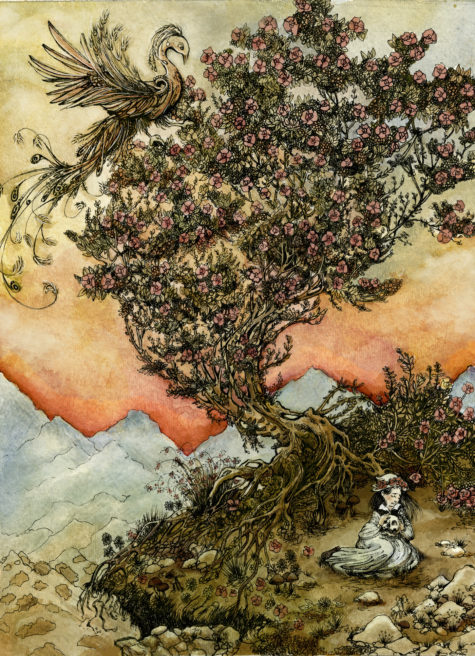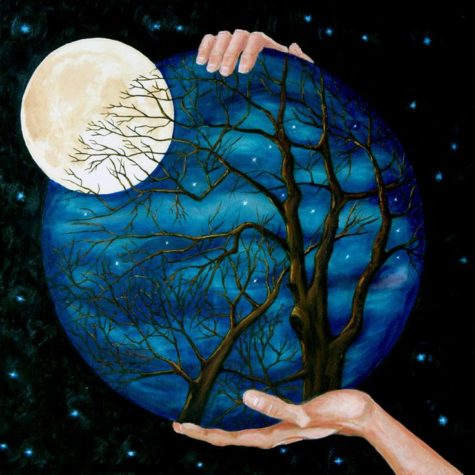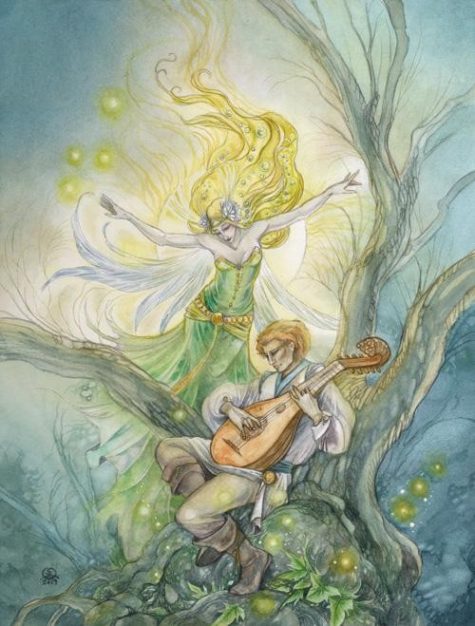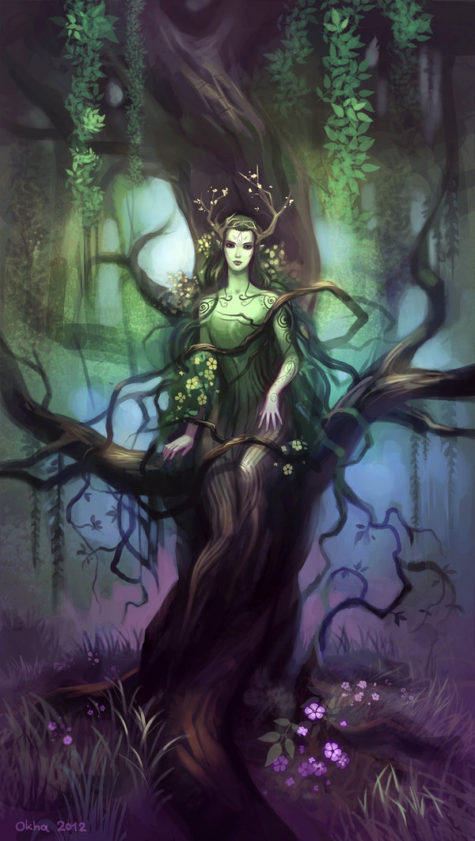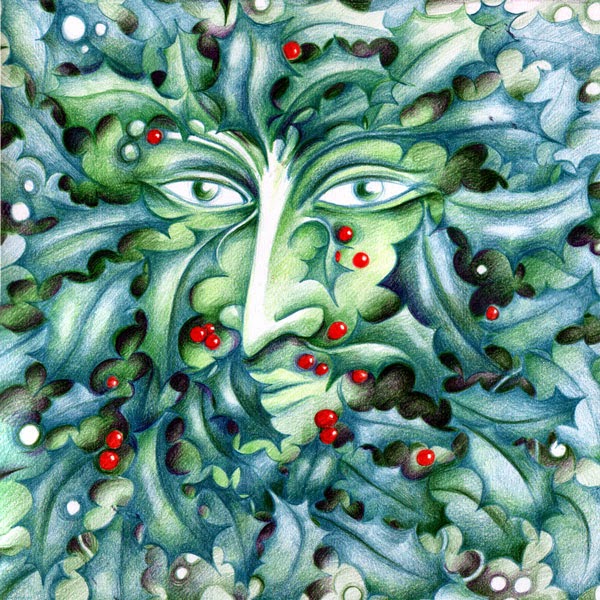Tree
Pine Needles Pray
Pine needles pray,
nestling down.
Their scent rises.
The Forest breathes
and exhales prayer.
Its wind moves
into fissures.
Granite takes
it in
and firmly
issues a
prayer to
a mushroom
lifted by its
bold touch
and sends it
down to
the juicy
soil-cracked
seeds
whose prayer
makes the
Forest tingle
down into the
roots of
the Great Oak
embracing
them all
and touching
the Great
River of
Light only
those who
pray can
enter.
~Jim Roberts
The Juniper Tree
Long ago, at least two thousand years, there was a rich man who had a beautiful and pious wife, and they loved each other dearly. However, they had no children, though they wished very much to have some, and the woman prayed for them day and night, but they didn’t get any, and they didn’t get any.
In front of their house there was a courtyard where there stood a juniper tree. One day in winter the woman was standing beneath it, peeling herself an apple, and while she was thus peeling the apple, she cut her finger, and the blood fell into the snow.
“Oh,” said the woman. She sighed heavily, looked at the blood before her, and was most unhappy. “If only I had a child as red as blood and as white as snow.” And as she said that, she became quite contented, and felt sure that it was going to happen.
Then she went into the house, and a month went by, and the snow was gone. And two months, and everything was green. And three months, and all the flowers came out of the earth. And four months, and all the trees in the woods grew thicker, and the green branches were all entwined in one another, and the birds sang until the woods resounded and the blossoms fell from the trees. Then the fifth month passed, and she stood beneath the juniper tree, which smelled so sweet that her heart jumped for joy, and she fell on her knees and was beside herself. And when the sixth month was over, the fruit was thick and large, and then she was quite still. And after the seventh month she picked the juniper berries and ate them greedily.
Then she grew sick and sorrowful. Then the eighth month passed, and she called her husband to her, and cried, and said, “If I die, then bury me beneath the juniper tree.” Then she was quite comforted and happy until the next month was over, and then she had a child as white as snow and as red as blood, and when she saw it, she was so happy that she died.
Her husband buried her beneath the juniper tree, and he began to cry bitterly. After some time he was more at ease, and although he still cried, he could bear it. And some time later he took another wife.
He had a daughter by the second wife, but the first wife’s child was a little son, and he was as red as blood and as white as snow. When the woman looked at her daughter, she loved her very much, but then she looked at the little boy, and it pierced her heart, for she thought that he would always stand in her way, and she was always thinking how she could get the entire inheritance for her daughter.
And the Evil One filled her mind with this until she grew very angry with the little boy, and she pushed him from one corner to the other and slapped him here and cuffed him there, until the poor child was always afraid, for when he came home from school there was nowhere he could find any peace.
One day the woman had gone upstairs to her room, when her little daughter came up too, and said, “Mother, give me an apple.”
“Yes, my child,” said the woman, and gave her a beautiful apple out of the chest. The chest had a large heavy lid with a large sharp iron lock.
“Mother,” said the little daughter, “is brother not to have one too?”
This made the woman angry, but she said, “Yes, when he comes home from school.”
When from the window she saw him coming, it was as though the Evil One came over her, and she grabbed the apple and took it away from her daughter, saying, “You shall not have one before your brother.”
She threw the apple into the chest, and shut it. Then the little boy came in the door, and the Evil One made her say to him kindly, “My son, do you want an apple?” And she looked at him fiercely.
“Mother,” said the little boy, “how angry you look. Yes, give me an apple.”
Then it seemed to her as if she had to persuade him. “Come with me,” she said, opening the lid of the chest. “Take out an apple for yourself.” And while the little boy was leaning over, the Evil One prompted her, and crash! she slammed down the lid, and his head flew off, falling among the red apples.
Then fear overcame her, and she thought, “Maybe I can get out of this.” So she went upstairs to her room to her chest of drawers, and took a white scarf out of the top drawer, and set the head on the neck again, tying the scarf around it so that nothing could be seen. Then she set him on a chair in front of the door and put the apple in his hand.
After this Marlene came into the kitchen to her mother, who was standing by the fire with a pot of hot water before her which she was stirring around and around.
“Mother,” said Marlene, “brother is sitting at the door, and he looks totally white and has an apple in his hand. I asked him to give me the apple, but he did not answer me, and I was very frightened.”
“Go back to him,” said her mother, “and if he will not answer you, then box his ears.”
So Marlene went to him and said, “Brother, give me the apple.” But he was silent, so she gave him one on the ear, and his head fell off. Marlene was terrified, and began crying and screaming, and ran to her mother, and said, “Oh, mother, I have knocked my brother’s head off,” and she cried and cried and could not be comforted.
“Marlene,” said the mother, “what have you done? Be quiet and don’t let anyone know about it. It cannot be helped now. We will cook him into stew.”
Then the mother took the little boy and chopped him in pieces, put him into the pot, and cooked him into stew. But Marlene stood by crying and crying, and all her tears fell into the pot, and they did not need any salt.
Then the father came home, and sat down at the table and said, “Where is my son?” And the mother served up a large, large dish of stew, and Marlene cried and could not stop.
Then the father said again, “Where is my son?”
“Oh,” said the mother, “he has gone across the country to his mother’s great uncle. He will stay there awhile.”
“What is he doing there? He did not even say good-bye to me.”
“Oh, he wanted to go, and asked me if he could stay six weeks. He will be well taken care of there.”
“Oh,” said the man, “I am unhappy. It isn’t right. He should have said good-bye to me.” With that he began to eat, saying, “Marlene, why are you crying? Your brother will certainly come back.”
Then he said, “Wife, this food is delicious. Give me some more.” And the more he ate the more he wanted, and he said, “Give me some more. You two shall have none of it. It seems to me as if it were all mine.” And he ate and ate, throwing all the bones under the table, until he had finished it all.
Marlene went to her chest of drawers, took her best silk scarf from the bottom drawer, and gathered all the bones from beneath the table and tied them up in her silk scarf, then carried them outside the door, crying tears of blood.
She laid them down beneath the juniper tree on the green grass, and after she had put them there, she suddenly felt better and did not cry anymore.
Then the juniper tree began to move. The branches moved apart, then moved together again, just as if someone were rejoicing and clapping his hands. At the same time a mist seemed to rise from the tree, and in the center of this mist it burned like a fire, and a beautiful bird flew out of the fire singing magnificently, and it flew high into the air, and when it was gone, the juniper tree was just as it had been before, and the cloth with the bones was no longer there. Marlene, however, was as happy and contented as if her brother were still alive. And she went merrily into the house, sat down at the table, and ate.
Then the bird flew away and lit on a goldsmith’s house, and began to sing:
My mother, she killed me,
My father, he ate me,
My sister Marlene,
Gathered all my bones,
Tied them in a silken scarf,
Laid them beneath the juniper tree,
Tweet, tweet, what a beautiful bird am I.
The goldsmith was sitting in his workshop making a golden chain, when he heard the bird sitting on his roof and singing. The song seemed very beautiful to him. He stood up, but as he crossed the threshold he lost one of his slippers. However, he went right up the middle of the street with only one slipper and one sock on. He had his leather apron on, and in one hand he had a golden chain and in the other his tongs. The sun was shining brightly on the street.
He walked onward, then stood still and said to the bird, “Bird,” he said, “how beautifully you can sing. Sing that piece again for me.”
“No,” said the bird, “I do not sing twice for nothing. Give me the golden chain, and then I will sing it again for you.”
The goldsmith said, “Here is the golden chain for you. Now sing that song again for me.” Then the bird came and took the golden chain in his right claw, and went and sat in front of the goldsmith, and sang:
My mother, she killed me,
My father, he ate me,
My sister Marlene,
Gathered all my bones,
Tied them in a silken scarf,
Laid them beneath the juniper tree,
Tweet, tweet, what a beautiful bird am I.
Then the bird flew away to a shoemaker, and lit on his roof and sang:
My mother, she killed me,
My father, he ate me,
My sister Marlene,
Gathered all my bones,
Tied them in a silken scarf,
Laid them beneath the juniper tree,
Tweet, tweet, what a beautiful bird am I.
Hearing this, the shoemaker ran out of doors in his shirtsleeves, and looked up at his roof, and had to hold his hand in front of his eyes to keep the sun from blinding him. “Bird,” said he, “how beautifully you can sing.”
Then he called in at his door, “Wife, come outside. There is a bird here. Look at this bird. He certainly can sing.” Then he called his daughter and her children, and the journeyman, and the apprentice, and the maid, and they all came out into the street and looked at the bird and saw how beautiful he was, and what fine red and green feathers he had, and how his neck was like pure gold, and how his eyes shone like stars in his head.
“Bird,” said the shoemaker, “now sing that song again for me.”
“No,” said the bird, “I do not sing twice for nothing. You must give me something.”
“Wife,” said the man, “go into the shop. There is a pair of red shoes on the top shelf. Bring them down.” Then the wife went and brought the shoes.
“There, bird,” said the man, “now sing that piece again for me.” Then the bird came and took the shoes in his left claw, and flew back to the roof, and sang:
My mother, she killed me,
My father, he ate me,
My sister Marlene,
Gathered all my bones,
Tied them in a silken scarf,
Laid them beneath the juniper tree,
Tweet, tweet, what a beautiful bird am I.
When he had finished his song he flew away. In his right claw he had the chain and in his left one the shoes. He flew far away to a mill, and the mill went clickety-clack, clickety-clack, clickety-clack. In the mill sat twenty miller’s apprentices cutting a stone, and chiseling chip-chop, chip-chop, chip-chop. And the mill went clickety-clack, clickety-clack, clickety-clack.
Then the bird went and sat on a linden tree which stood in front of the mill, and sang:
My mother, she killed me,
Then one of them stopped working.
My father, he ate me,
Then two more stopped working and listened,
My sister Marlene,
Then four more stopped,
Gathered all my bones,
Tied them in a silken scarf,
Now only eight only were chiseling,
Laid them beneath
Now only five,
the juniper tree,
Now only one,
Tweet, tweet, what a beautiful bird am I.
Then the last one stopped also, and heard the last words. “Bird,” said he, “how beautifully you sing. Let me hear that too. Sing it once more for me.”
“No,” said the bird, “I do not sing twice for nothing. Give me the millstone, and then I will sing it again.”
“Yes,” he said, “if it belonged only to me, you should have it.”
“Yes,” said the others, “if he sings again he can have it.”
Then the bird came down, and the twenty millers took a beam and lifted the stone up. Yo-heave-ho! Yo-heave-ho! Yo-heave-ho!
The bird stuck his neck through the hole and put the stone on as if it were a collar, then flew to the tree again, and sang:
My mother, she killed me,
My father, he ate me,
My sister Marlene,
Gathered all my bones,
Tied them in a silken scarf,
Laid them beneath the juniper tree,
Tweet, tweet, what a beautiful bird am I.
When he was finished singing, he spread his wings, and in his right claw he had the chain, and in his left one the shoes, and around his neck the millstone. He flew far away to his father’s house.
In the room the father, the mother, and Marlene were sitting at the table.
The father said, “I feel so contented. I am so happy.”
“Not I,” said the mother, “I feel uneasy, just as if a bad storm were coming.”
But Marlene just sat and cried and cried.
Then the bird flew up, and as it seated itself on the roof, the father said, “Oh, I feel so truly happy, and the sun is shining so beautifully outside. I feel as if I were about to see some old acquaintance again.”
“Not I,” said the woman, “I am so afraid that my teeth are chattering, and I feel like I have fire in my veins.” And she tore open her bodice even more. Marlene sat in a corner crying. She held a handkerchief before her eyes and cried until it was wet clear through.
Then the bird seated itself on the juniper tree, and sang:
My mother, she killed me,
The mother stopped her ears and shut her eyes, not wanting to see or hear, but there was a roaring in her ears like the fiercest storm, and her eyes burned and flashed like lightning.
My father, he ate me,
“Oh, mother,” said the man, “that is a beautiful bird. He is singing so splendidly, and the sun is shining so warmly, and it smells like pure cinnamon.”
My sister Marlene,
Then Marlene laid her head on her knees and cried and cried, but the man said, “I am going out. I must see the bird up close.”
“Oh, don’t go,” said the woman, “I feel as if the whole house were shaking and on fire.”
But the man went out and looked at the bird.
Gathered all my bones,
Tied them in a silken scarf,
Laid them beneath the juniper tree,
Tweet, tweet, what a beautiful bird am I.
With this the bird dropped the golden chain, and it fell right around the man’s neck, so exactly around it that it fit beautifully. Then the man went in and said, “Just look what a beautiful bird that is, and what a beautiful golden chain he has given me, and how nice it looks.”
But the woman was terrified. She fell down on the floor in the room, and her cap fell off her head. Then the bird sang once more:
My mother killed me.
“I wish I were a thousand fathoms beneath the earth, so I would not have to hear that!”
My father, he ate me,
Then the woman fell down as if she were dead.
My sister Marlene,
“Oh,” said Marlene, “I too will go out and see if the bird will give me something.” Then she went out.
Gathered all my bones,
Tied them in a silken scarf,
He threw the shoes down to her.
Laid them beneath the juniper tree,
Tweet, tweet, what a beautiful bird am I.
Then she was contented and happy. She put on the new red shoes and danced and leaped into the house. “Oh,” she said, “I was so sad when I went out and now I am so contented. That is a splendid bird, he has given me a pair of red shoes.”
“No,” said the woman, jumping to her feet and with her hair standing up like flames of fire, “I feel as if the world were coming to an end. I too, will go out and see if it makes me feel better.”
And as she went out the door, crash! the bird threw the millstone on her head, and it crushed her to death.
The father and Marlene heard it and went out. Smoke, flames, and fire were rising from the place, and when that was over, the little brother was standing there, and he took his father and Marlene by the hand, and all three were very happy, and they went into the house, sat down at the table, and ate.
Story by Jacob and Wilhelm Grimm
Earth Teach Me To Remember
Earth teach me stillness
as the grasses are stilled with light.
Earth teach me suffering
as old stones suffer with memory.
Earth teach me humility
as blossoms are humble with beginning.
Earth Teach me caring
as the mother who secures her young.
Earth teach me courage
as the tree which stands alone.
Earth teach me limitation
as the ant which crawls on the ground.
Earth teach me freedom
as the eagle which soars in the sky.
Earth teach me resignation
as the leaves which die in the fall.
Earth teach me regeneration
as the seed which rises in the spring.
Earth teach me to forget myself
as melted snow forgets its life.
Earth teach me to remember kindness
as dry fields weep in the rain.
by John Yellow Lark
Wu Gang Chopping Laurel Tree
If look carefully at the moon in clear nights, one can see a black shadow on it. Here is an explanation from a Chinese fairy tale.
Long time ago, there was a man from Xihe of Han Dynasty (202 BC – 220 AD) named Wu Gang. He once followed the immortals to cultivate himself and became an immortal too. However, when in the heaven, he made a mistake and was banished to the moon to chop the laurel tree. This laurel tree growing in front of the Moon Palace was very flourishing and tall. Each time Wu Gang chopped it, it grew back right. This happened again and again and the tree was never cut down. The endless hard job was a punishment for Wu Gang.
From: China Travel Guide
Beneath The Eildon Tree
The Dryad
Here is a story about a Dryad by Hans Christian Anderson.
We are travelling to Paris to the Exhibition. Now we are there. That was a journey, a flight without magic. We flew on the wings of steam over the sea and across the land. Yes, our time is the time of fairy tales.
We are in the midst of Paris, in a great hotel. Blooming flowers ornament the staircases, and soft carpets the floors.
Our room is a very cozy one, and through the open balcony door we have a view of a great square. Spring lives down there; it has come to Paris, and arrived at the same time with us. It has come in the shape of a glorious young chestnut tree, with delicate leaves newly opened. How the tree gleams, dressed in its spring garb, before all the other trees in the place! One of these latter had been struck out of the list of living trees. It lies on the ground with roots exposed. On the place where it stood, the young chestnut tree is to be planted, and to flourish.
It still stands towering aloft on the heavy wagon which has brought it this morning a distance of several miles to Paris. For years it had stood there, in the protection of a mighty oak tree, under which the old venerable clergyman had often sat, with children listening to his stories.
The young chestnut tree had also listened to the stories; for the Dryad who lived in it was a child also. She remembered the time when the tree was so little that it only projected a short way above the grass and ferns around. These were as tall as they would ever be; but the tree grew every year, and enjoyed the air and the sunshine, and drank the dew and the rain. Several times it was also, as it must be, well shaken by the wind and the rain; for that is a part of education.
The Dryad rejoiced in her life, and rejoiced in the sunshine, and the singing of the birds; but she was most rejoiced at human voices; she understood the language of men as well as she understood that of animals.
Butterflies, cockchafers, dragon-flies, everything that could fly came to pay a visit. They could all talk. They told of the village, of the vineyard, of the forest, of the old castle with its parks and canals and ponds. Down in the water dwelt also living beings, which, in their way, could fly under the water from one place to another—beings with knowledge and delineation. They said nothing at all; they were so clever!
And the swallow, who had dived, told about the pretty little goldfish, of the thick turbot, the fat brill, and the old carp. The swallow could describe all that very well, but, “Self is the man,” she said. “One ought to see these things one’s self.” But how was the Dryad ever to see such beings? She was obliged to be satisfied with being able to look over the beautiful country and see the busy industry of men.
It was glorious; but most glorious of all when the old clergyman sat under the oak tree and talked of France, and of the great deeds of her sons and daughters, whose names will be mentioned with admiration through all time.
Then the Dryad heard of the shepherd girl, Joan of Arc, and of Charlotte Corday; she heard about Henry the Fourth, and Napoleon the First; she heard names whose echo sounds in the hearts of the people.
The village children listened attentively, and the Dryad no less attentively; she became a school-child with the rest. In the clouds that went sailing by she saw, picture by picture, everything that she heard talked about. The cloudy sky was her picture-book.
She felt so happy in beautiful France, the fruitful land of genius, with the crater of freedom. But in her heart the sting remained that the bird, that every animal that could fly, was much better off than she. Even the fly could look about more in the world, far beyond the Dryad’s horizon.
France was so great and so glorious, but she could only look across a little piece of it. The land stretched out, world-wide, with vineyards, forests and great cities. Of all these Paris was the most splendid and the mightiest. The birds could get there; but she, never!
Among the village children was a little ragged, poor girl, but a pretty one to look at. She was always laughing or singing and twining red flowers in her black hair.
“Don’t go to Paris!” the old clergyman warned her. “Poor child! if you go there, it will be your ruin.”
But she went for all that. Continue reading
James Cheney: Invocation To The Dark Mother
Daniel: Prayer Before The Final Battle
blessed obyno: Queen of Ghosts
blessed obyno: Queen of Ghosts
Caerlion Arthur: The Great, Bloody and Bruised Veil of the World

